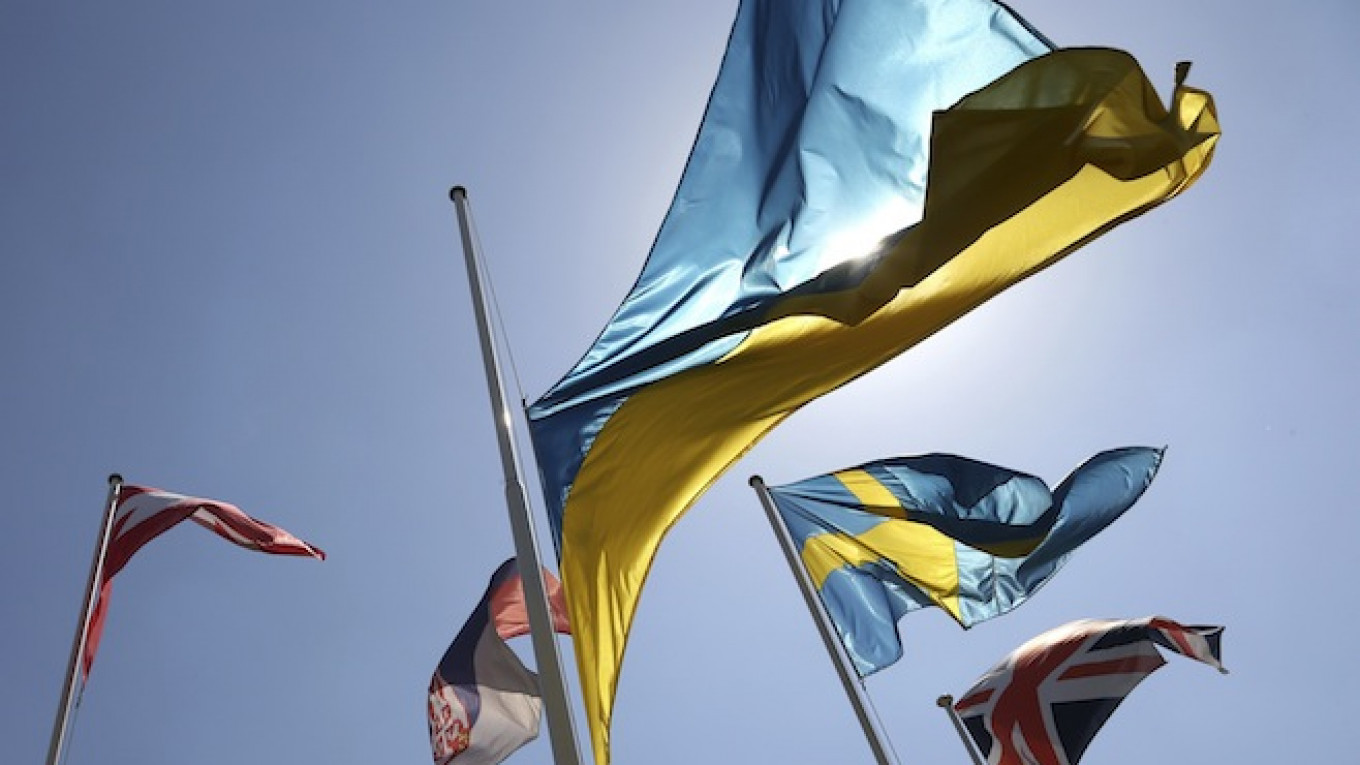BRUSSELS — European Union ambassadors will debate proposals on Thursday on restricting Russian access to Europe's capital markets and defense and energy technology, but are not expected to make a quick decision.
Ambassadors from the 28 EU nations are expected to agree on Thursday to add the names of some Russian companies that are helping to undermine Ukraine's sovereignty to the bloc's sanctions list, using new expanded criteria.
But they will probably need more time to agree to go beyond the asset freezes so far imposed by the EU and restrict Russia's access to Europe's financial markets and technology.
Despite threatening tough action since Russia's annexation of Ukraine's Crimea region in March, the EU has been divided over imposing economic sanctions on its main gas supplier.
But the downing last week of a Malaysia Airlines plane over eastern Ukraine, killing the 298 people on board, has jolted the EU into action.
Foreign ministers for the first time this week singled out sectors of the Russian economy that the EU might target with sanctions in protest at Moscow's actions in eastern Ukraine.
The ministers said on Tuesday they could restrict Russia's access to capital markets, defense and sensitive technologies "including in the energy sector" unless Russia halts the flow of weapons across the Ukrainian border.
To avoid tougher sanctions, Moscow would also have to use its influence with pro-Russian rebels in Ukraine to allow an independent investigation into what brought down flight MH17.
"The Commission will be tabling tomorrow a paper with actions on each of the areas which were identified by the Foreign Affairs Council [ministers]," European Commission spokeswoman Pia Ahrenkilde Hansen told reporters on Wednesday.
Minute's Silence
The EU's executive body held a minute's silence earlier in memory of those killed on the Malaysian airliner, which Washington says was downed by a surface-to-air missile fired from rebel-held territory in eastern Ukraine.
European Energy Commissioner Guenther Oettinger suggested on Wednesday that the EU should not give Russia technical help to develop Arctic oil and gas fields if Moscow failed to help defuse the Ukraine crisis.
EU ambassadors will probably want to consult their capitals about the Commission's proposals before taking a decision on tougher sanctions and are likely to hold further discussions on July 29, diplomats said.
The ambassadors also have to decide how long the EU will give Russia to comply with its demands before imposing the sanctions.
One reason it has been so difficult for EU governments to agree to target sectors of the Russian economy with sanctions is that they fear some EU countries could suffer more than others from lost trade or from possible Russian retaliation.
The package of measures proposed by the foreign ministers was designed to balance the pain among EU member states.
But data indicates that Germany and Italy have most to lose if the EU makes good on its threat, while Britain's overseas territories are soaking up the lion's share of capital streaming out of Russia.
If ambassadors agree to the sanctions, it remains uncertain whether EU leaders would have to call an extraordinary summit meeting to approve them or whether governments would approve the decision in writing, without the need for a meeting.
Also at Thursday's meeting, ambassadors are expected to agree on a legal regulation broadening the scope of EU sanctions to include people and companies that support or benefit from Russian decision-makers responsible for annexing Crimea or destabilizing eastern Ukraine.
However, it may take until next week to publish a first list of people and companies targeted with asset freezes under this measure. Ambassadors will also work on additional measures to restrict EU trade with and investment in Crimea.
See also:
EU Mulls Defense, Energy Sanctions After Plane Crash
Cut Ties With Ukraine Cost Russian Defense Industry $940 Million
A Message from The Moscow Times:
Dear readers,
We are facing unprecedented challenges. Russia's Prosecutor General's Office has designated The Moscow Times as an "undesirable" organization, criminalizing our work and putting our staff at risk of prosecution. This follows our earlier unjust labeling as a "foreign agent."
These actions are direct attempts to silence independent journalism in Russia. The authorities claim our work "discredits the decisions of the Russian leadership." We see things differently: we strive to provide accurate, unbiased reporting on Russia.
We, the journalists of The Moscow Times, refuse to be silenced. But to continue our work, we need your help.
Your support, no matter how small, makes a world of difference. If you can, please support us monthly starting from just $2. It's quick to set up, and every contribution makes a significant impact.
By supporting The Moscow Times, you're defending open, independent journalism in the face of repression. Thank you for standing with us.
Remind me later.






